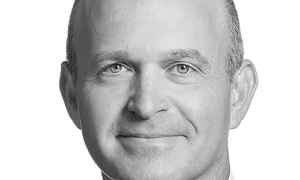On the evening of May 29, at Roy Thomson Hall in downtown Toronto, Kellyanne Conway and I will debate Ezra Klein and Ben Rhodes. The proposition: This is America’s Golden Age.
I will argue—without apology—that it is the beginning of such an era in American history.
Now, I know I’m walking into a headwind.
A survey taken in April 2025 shows that just 26% of Canadians view the United States positively, down 28 points from last July. Worse still, that’s four points below the number who hold a favorable view of Communist China. Let’s not kid ourselves—the room will be filled with Torontonians—cosmopolitan, secular and suspicious of American strength.
And our opponents will make full use of that.
>>> Going on Offense
Ben Rhodes, former deputy national security adviser under Barack Obama, will no doubt paint President Donald Trump’s “America First” foreign policy as dangerous, backwards and possibly even fascist. He’ll gesture toward foreign conflicts and insist Trump is undermining the world order and empowering strongmen abroad.
Ezra Klein, writing from the editorial heights of The New York Times, will likely pivot to domestic matters. His golden age, as articulated in his new book, looks like a Leviathan state imposing a green revolution from the top down in the name of “abundance.” He’ll argue that Trump’s reforms have made the government more corrupt, not more capable.
And yes—they’ll both probably mention, with theatrical outrage, Trump’s quip about Canada becoming our 51st state.
But all their finger-wagging will miss the mark.
America’s new golden age is not a product of Trump alone, or of some novel doctrine in foreign affairs, or even of a reinvigorated administrative state. It is something far deeper, far older and far more consequential. It is the rebirth of the simple but revolutionary idea that our nation must not be ruled by technocrats defending the interests of an elite class, but governed by the people and focused on championing the simple faith, freedom and family values found at the everyday American’s dinner table.
Klein and Rhodes can’t see this. Their world view is frozen in the years when they still held sway—the waning days of the Obama era. But the revolt began then. Trump’s 2016 victory cracked the system. His 2020 defeat—mired in irregularities and delivered amid a pandemic that exposed rot at the core of our institutions—blew it wide open.
When states like Pennsylvania changed election laws in the eleventh hour, Americans saw it for what it was—manipulation. When mandates forced millions to take experimental vaccines, they saw the corporate state in action. When children were catechized with radical ideologies over Zoom calls, Americans saw the corruption of public education. And when churches were closed week after week, even those Americans who didn’t believe in God felt the spiritual tyranny of a regime that had lost all reverence for the sacred.
And when the Canadian government arrested and de-banked peaceful truckers in Ottawa, Americans saw a mirror—and a warning.
The result? A great unravelling—and a great awakening.
The public’s trust in elite institutions has collapsed. But in its place, new life is gathering momentum. The vacuum left by corporate media has been filled by men like Joe Rogan and Canada’s own Jordan Peterson, who speak plainly and defend free thought. The hollowing out of public health has birthed a grassroots movement to make America healthy in body and spirit. The failure of public schools has ignited a renaissance in classical education, returning young Americans to the eternal truths of the West.
This same renewal is underway in higher education, in business, in culture and in politics.
Everywhere you look, Americans—black and white, urban and rural, religious and secular—are saying “enough.” They are building new institutions, grounded in timeless principles. They are rediscovering ordered liberty, moral clarity and national purpose. They are rejecting the rule of the managerial elite and reclaiming the mantle of self-government.
That is what makes this the dawn of a new golden age.
Rhodes and Klein, ensconced in the power centers of Washington, New York and Los Angeles, remain blind to it. But some Canadians may see it more clearly than they do. After all, we share more than a border. We share a legacy. A frontier spirit.
A civilizational inheritance rooted in the dignity of the individual and the sovereignty of the people.
On May 29, I will say this to our Canadian friends: Whether or not you wish to be the 51st state, you should want to be part of what’s happening in America today. Because this golden age is not just an American revival—it is a rebuke to the failed technocracy of the Western world. And it is just beginning.
This piece originally appeared in the Toronto Sun on May 27, 2025





